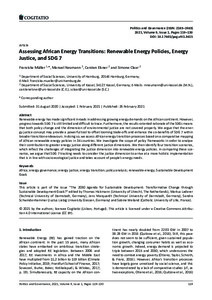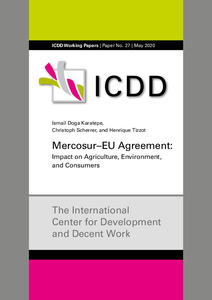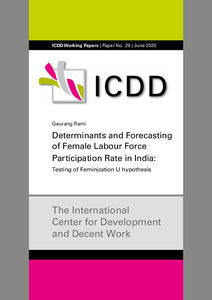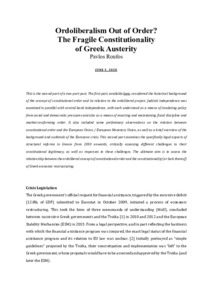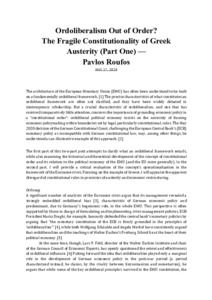Suche
Anzeige der Dokumente 1-6 von 6
Aufsatz

 Assessing African Energy Transitions: Renewable Energy Policies, Energy Justice, and SDG 7
Assessing African Energy Transitions: Renewable Energy Policies, Energy Justice, and SDG 7
(2021-02-26)
Renewable energy has made significant inroads in addressing growing energy demands on the African continent. However, progress towards SDG 7 is still limited and difficult to trace. Furthermore, the results-oriented rationale of the SDGs means that both policy change and the dimension of environmental justice are not covered properly. We argue that the energy justice concept may provide a powerful tool to offset looming trade-offs and enhance the co-benefits of SDG 7 within broader transition endeavours. In doing so, ...
Working paper

 Legal Aid Ontario lawyers organizing against the odds: A case study of professional workers unionizing
Legal Aid Ontario lawyers organizing against the odds: A case study of professional workers unionizing
(kassel university press, 2020-06)
Working paper

 Mercosur–EU Agreement: Impact on Agriculture, Environment, and Consumers
Mercosur–EU Agreement: Impact on Agriculture, Environment, and Consumers
(kassel university press, 2020-05-06)
Working paper

 Determinants and Forecasting of Female Labour Force Participation Rate in India: Testing of Feminization U hypothesis
Determinants and Forecasting of Female Labour Force Participation Rate in India: Testing of Feminization U hypothesis
(kassel university press, 2020-06)
Greater involvement of women within the labour force has economic and social impact. The Female Labour Force Participation Rate (FLFPR) for India remains appallingly low at around 27%, while the male labour force participation rate has been 79.9%. In India, during 1990–2016, the FLFPR (% of female population age 15+) showed a declining trend.
In this paper, the determinants of FLFPR for India have been estimated using regression analysis for the time period 1990–2016. Data on all the relevant variables have been ...
Aufsatz

 Ordoliberalism Out of Order? The Fragile Constitutionality of Greek Austerity (Part Two)
Ordoliberalism Out of Order? The Fragile Constitutionality of Greek Austerity (Part Two)
(2020-06)
This is the second part of a two-part post. The first part, available here, considered the historical background of the concept of constitutional order and its relation to the ordoliberal project. Judicial independence was examined in parallel with central bank independence, with each understood as a means of insulating policy from social and democratic pressures and also as a means of enacting and maintaining fiscal discipline and market-conforming order. It also included some preliminary observations on the relation ...
Verschiedenartige Texte

 Ordoliberalism Out of Order? The Fragile Constitutionality of Greek Austerity (Part One)
Ordoliberalism Out of Order? The Fragile Constitutionality of Greek Austerity (Part One)
(2020-05)
The architecture of the European Monetary Union (EMU) has often been understood to be built on a fundamentally ordoliberal framework. [1] The precise characteristics of what constitutes an ordoliberal framework are often not clarified, and they have been widely debated in contemporary scholarship. But a crucial characteristic of ordoliberalism, and one that has received comparatively little attention, concerns the importance of grounding economic policy in a “constitutional order”: ordoliberal political economy insists ...

